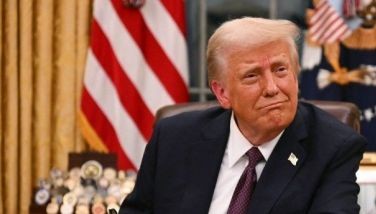United States, 11 Pacific Rim countries reach trade deal
WASHINGTON - The United States and 11 other Pacific Rim countries have agreed to an ambitious and contentious trade pact that cuts trade barriers, sets labor and environmental standards and protects multinational corporations' intellectual property.
The agreement on the Trans Pacific Partnership was reached yesterday after marathon negotiating sessions in Atlanta through the weekend.
"We think it helps define the rules of the road for the Asia-Pacific region," said US Trade Rep. Michael Froman.
The agreement will face intense scrutiny from a skeptical Congress.
The TPP is designed to encourage trade between the United States, Australia, Brunei, Canada, Chile, Japan, Malaysia, Mexico, New Zealand, Peru, Singapore and Vietnam
Japanese Prime Minister Shinzo Abe welcomed the basic agreement as "a farsighted policy for all participating countries that share the values and try to build a free and fair economic zone."
The White House says the agreement will eliminate tariffs on all made-in-America manufactured goods exported to TPP countries.
"This partnership levels the playing field for our farmers, ranchers, and manufacturers by eliminating more than 18,000 taxes that various countries put on our products," President Barack Obama said in a statement. "It includes the strongest commitments on labor and the environment of any trade agreement in history, and those commitments are enforceable, unlike in past agreements."
For President Barack Obama, the trade deal is a major victory on a centerpiece of his international agenda.
View gallery
United States, 11 Pacific Rim countries reach trade …
FILE - In this Nov. 10, 2014 file photo, US President Barack Obama, center, speaks during his mee …
Obama has pursued the pact against the objections of many lawmakers in his own Democratic Party and instead forged rare consensus with Republicans. He's cast the agreement as good for Americans workers and crucial to expanding US influence in the Asia-Pacific, a fast-growing region he says should be a bigger focus of the nation's foreign policy.
The deal still has to be approved by the US Congress, where opposition is widespread from Democrats who fear it will cost jobs and from Republicans suspicious that Obama's team has negotiated a bad deal. The president has to wait 90 days before signing the pact, and only then will Congress begin the process of voting on it.
As a result, a vote on TPP likely will not happen until well into 2016. Given the political sensitivity of the deal, supporters of the agreement may push to hold the vote as far ahead of next year's elections as possible. Congress can only give the deal an up-or-down vote; it can't amend the agreement.
Many of the tariff reductions and other changes will be phased in over several years, so benefits to the US economy could take time to materialize.
Peter Petri, a professor of international finance at Brandeis University, says he doesn't expect the deal to lead to any US job gains. But he forecasts it will boost US incomes by $77 billion a year, or 0.4 percent, by 2025, mostly by creating export-oriented jobs that will pay more, even as other jobs are lost.
Trade unions and other critics say the deal will expose American workers to foreign competition and cost jobs.
"Working people know that TPP would be a disaster," Chris Shelton, president of the Communications Workers of America. "It would continue the offshoring of jobs and weakening of our communities."
Another target for critics was drug companies' efforts to protect their pharmaceutical patents.
US drug makers wanted 12 years of protection from competitors for biologics — ultra-expensive medicines produced in living cells. That is longer than in any country but the United States. Critics say blocking competition from near-copies drives up drug prices and makes them too expensive for people in poor countries.
Drug companies didn't get the dozen years they wanted, but it wasn't immediately clear how many years of protection they did get under yesterday's agreement.
Judit Rius Sanjuan, legal policy adviser to Doctors Without Borders, said in a statement that "TPP will still go down in history as the worst trade agreement for access to medicines in developing countries, which will be forced to change their laws to incorporate abusive intellectual property protections for pharmaceutical companies."
The Obama administration has also pursued the deal as part of a strategy to lift US influence in fast-growing Asia and to counter China's growing influence. China, the world's second-largest economy, is not part of the agreement, but potentially could join later.
Late last month, 160 members of Congress from both parties wrote Obama to urge that the agreement limit the ability of governments to lower the value of their currencies to gain a trade advantage. A cheaper currency makes imports less expensive. The final pact, however, doesn't include provisions on currency.
Instead, the issue is being discussed in a separate process by finance minister, Australia's trade minister Andrew Robb said during a press conference announcing the deal.
- Latest
- Trending

































